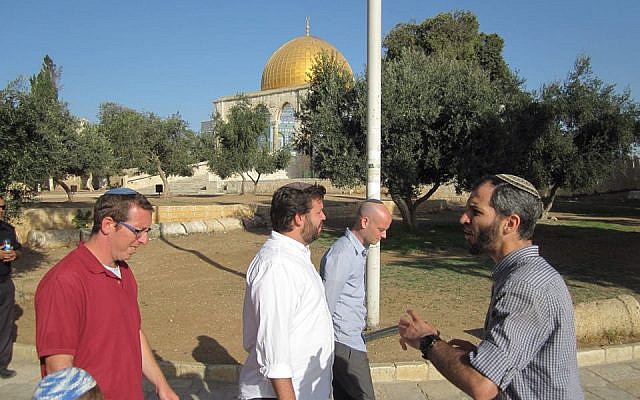Candidates vie for spots behind party chief Bezalel Smotrich, who is pushing to soften faction’s hardline image and snag Yamina voters, though Otzma merger may upend list anyway
<
>

Religious Zionism party head Bezalel Smotrich, right, and MK Orit Strock in a faction meeting at the Knesset on November 1, 2021. (Olivier Fitoussi/Flash90)<
>
<
>
The right-wing Religious Zionism party is set to hold its first-ever primary on Tuesday, with its 24,000 registered members having a chance to determine the makeup of its Knesset slate by choosing from a lineup of candidates ranging from mainline nationalists to ultra-conservative extremists.
Party leader Bezalel Smotrich has called a primary in hopes that Religious Zionism can draw in more religiously liberal voices that will vie for the votes being hemorrhaged from the crumbling Yamina party. Party sources say the chief fight will be between those on the more moderate end of the far-right spectrum and those on the more extreme right.
The primary is being held despite ongoing efforts to bring ultra-right MK Itamar Ben Gvir’s Otzma Yehudit party back into an alliance with Religious Zionism, which would result in a combined slate. Such an alliance would likely dampen the significance of the primary, but also amplify the importance of being a top vote-getter in order to be better protected from being shuffled off the roster.
Party sources have repeatedly said that primaries were called in large part to bring broader representation to its candidate list. The party is eyeing the handful of right-wing Knesset seats up for grabs following the collapse of Yamina, which has bled support since leader Naftali Bennett joined a big tent coalition in exchange for becoming prime minister.
Several other right-wing parties are also scrambling to mop up the votes Yamina left on the table, including Zionist Spirit, led by Ayelet Shaked, one of the hobbled party’s founders. In a twist, the second and third slots on Zionist Spirit are held by Yoaz Hendel and Amitai Porat, whose uncle Zvi Hendel and father Hanan Porat founded the Tekuma party, rebranded by Smotrich last year as Religious Zionism.
About a third of Yamina’s voters identify as religious Zionists, but many have been skittish about aligning with the eponymous party because of its hardline views on non-Jews and Palestinians, as well as the associations of some on its slate with racist ultranationalist movements.

Israeli right wing politician Bezalel Smotrich speaks at a rally protesting the demolition of structures in the illegal outpost of Homesh, outside the Prime Minister’s office in Jerusalem on January 13, 2021. (Olivier Fitoussi/FLASH90)<
>
<
>
The central contest among the 16 candidates for the party’s Knesset slate is between hardliners and slightly more liberal members. Still, all of the party’s politicians are solidly right-wing, pro-settlement and against aligning with Arab parties.
On the more liberal side are politicians like Simcha Rothman, who made a name for himself in the past Knesset term advocating for judicial reform and free market economic policies. A newcomer in this camp is Yosef Speizer, a Jerusalem City Council member who held a spot on Yamina’s list in 2021.
On the other extreme are lawmakers like Orit Strock, a leader of Hebron’s Jewish community who has worked to defend settlers accused of abusing Palestinians.
The flank includes political freshman Arnon Segal, son of Makor Rishon editor Hagai Segal and brother of Channel 12 political commentator Amit Segal. Segal is mainly known as an advocate for changing the status quo on Jerusalem’s politically charged Temple Mount to allow Jewish worship on the holy site.

Arnon Segal, right, with Jewish visitors on the Temple Mount, September 2014 (Michael Naftali Unterberg Facebook page)<
>
<
>
Many in this camp are more religious, tending toward a messianic blend of nationalism and Haredi ideology.
While Smotrich is authorized to place candidates into reserved spots on his party list, he has not yet declared whether he intends to make use of that power to augment the list’s composition, likely waiting for primary results.
He may have no choice but to move people around, however, should talks on allying with Otzma Yehudit bear fruit.
Polls have shown a combined slate getting 10-13 seats in the Knesset election on November 1, while Religious Zionism would fall to roughly half that without Ben Gvir.

MK Itamar Ben Gvir of the far right Otzma Yehudit party tours the Mahane Yehuda market in Jerusalem on July 22, 2022. (Yonatan Sindel/Flash90)<
>
<
>
Opposition leader Benjamin Netanyahu, the matchmaker who first brought Smotrich and Ben Gvir together, is continuing to try and rekindle the flame. On Monday, he told Channel 13 news that “we will do everything to unite them.”
The two parties have until final candidate lists are due on September 15 to iron out details.
Primary results are expected on Tuesday evening, as most of the vote is expected to be conducted electronically, though the party will also have four physical polling stations in Jerusalem, Haifa, Beersheba, and Petah Tivka.
Although the legal age to vote for Knesset is 18 and Israel does not allow absentee voting, primary rules are determined by parties. Religious Zionism has opened its primary to registered party members as young as 17, and voting can take place electronically from anywhere.



Leave a Reply
You must be logged in to post a comment.